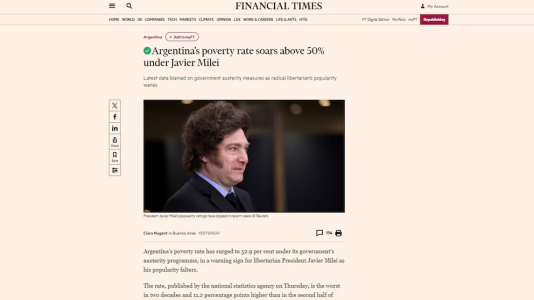All the Answers
Well-known member
The data on poverty in Argentina reached the Financial Times: “It is a warning sign for Milei” - Infobae

Source:

El dato de pobreza en Argentina llegó al Financial Times: “Es una señal de advertencia para Milei”
El medio especializado británico resaltó que el indicador alcanzó el 52,9%, la cifra más alta en dos décadas. Atribuye el fenómeno a la herencia y a las políticas de ajuste del Presidente
Seeptember 27, 2024
The British specialist media highlighted that the indicator reached 52.9%, the highest figure in two decades. It attributes the phenomenon to the legacy and the adjustment policies of the President.

The original publication in the specialized newspaper
The Financial Times , one of the world's leading economic media outlets, published an analysis that highlights the alarming rise in poverty in Argentina , a reality that already affects 52.9% of the population, according to official data. The British newspaper attributes this unprecedented rise in the last twenty years to the austerity policies promoted by the government of Javier Milei , who took power in December 2023 with the promise of stabilising the economy.
The article highlights that the poverty rate “is the worst in two decades and 11.2 percentage points higher than in the second half of 2023, when it stood at 41.7 percent.” This implies that 3.4 million Argentines have fallen into poverty so far this year , a figure that the Financial Times describes as “a warning sign for the libertarian president, Javier Milei , as his popularity falters.”
Since Milei took office, the publication notes, he has adopted an aggressive plan to reduce public spending, with the aim of curbing inflation that had reached levels close to 300% annually in April. According to the Financial Times , “ Milei has cut public spending in an effort to reduce inflation that peaked at close to 300 percent in April,” which has eroded the purchasing power of both workers and retirees.
The British newspaper explains that “economists say the root cause of high inflation is the money printed to finance the spending of previous left-wing Peronist governments.” However, it clarifies that the policies of the current government have also aggravated the situation: “the elimination of price controls and a devaluation of the peso under Milei have also contributed” to the inflationary crisis.
The government, through its spokesman Manuel Adorni , defended its austerity programme by arguing that the country was “on the brink of hyperinflation” and that the measures implemented had avoided a major economic catastrophe. “They had left us on the brink of becoming a country where practically all residents would be poor,” Adorni said before the publication of the poverty figures.

Income poverty reached 52.9 percent (AP)
However, the Financial Times has cited critics who believe the cuts are worsening the economic situation. Victoria Tolosa Paz , a member of the Peronist bloc, harshly criticised the cuts, saying that “the government’s relentless austerity is hitting working families and the elderly, deepening the crisis instead of generating solutions,” an opinion she shared on her X account , formerly known as Twitter.
The article also mentions that, along with rising poverty, Milei ’s popularity has begun to fall in the polls. According to a survey by the consultancy Poliarquía , “the proportion of Argentines with a positive view of Milei fell 7 percentage points between August and September, to 40 percent.” However, the overall approval rating of his government remained relatively high, with a slight decrease of two points, standing at 53%.
The deterioration in the perception of Milei 's management has been more noticeable among retirees, who have been particularly affected by the presidential veto of a law that had approved an increase in pension spending. Cristian Buttié , director of the consulting firm CB , explained that his pollster recorded a 4.2% drop in support for Milei between August and September, reaching 46.4%. Buttié emphasizes that there was "a particularly strong drop among retirees," who have been one of the sectors most affected by the government's measures.
Despite the recessionary climate and mounting criticism, the government has reported some positive data. According to official figures published on Wednesday, economic activity grew by 1.7% in July compared to the previous month, exceeding analysts’ projections. However, the Financial Times warns that these optimistic figures may not be enough to reverse the negative perception among the population. “ This news will only help Milei if and when the improvement is palpable for the average citizen ,” said Buttié , warning that “for now it seems that we have entered a recessionary climate, with the feeling that things are worse than before.”
The article also notes that the government's narrative, which attempts to show that the adjustment is beginning to bear fruit, is faced with a reality in which the purchasing power and quality of life of most Argentines have been severely affected. If the government fails to quickly demonstrate that its policies are working, its ability to maintain popular support could be further weakened.
Finally, the Financial Times concludes that the challenge for Milei will not only be to stabilise the economy, but also to “recover the narrative that things are going in the right direction”. Meanwhile, growing poverty and rampant inflation continue to undermine the well-being of millions of Argentines, a reality that tests the president’s promises and his ability to lead a lasting economic transformation.

